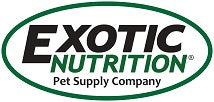.jpg)
In the wild, a hedgehog is opportunistic and will eat many things, but the majority of their diet comprises insects.
Our suggestion is to offer Exotic Nutrition's Hedgehog Complete free choice- keep this diet available at all times. Supplemental food that can help vary the diet include Premium Insectivore Diet which is made with high quality CHICKEN-BASED protein along with heart-healthy omega-3 fatty acids that provide balanced nutrition. Another option is Berries & Bugs- a nutritious granular formula containing gut loaded insect larva, grains and berries.
As insectivores, hedgehogs need a diet that is high in protein and low in fat. They also require chitin, which comes from the exoskeleton of insects; fiber in the diet may substitute for the chitin component. There are prepared foods specifically for pet hedgehogs and insectivores, including foods made from insect components. Exotic Nutrition's Hedgehog Complete is one such diet. It was formulated specifically for hedgehogs, and contains dried mealworms which contain chitin. Also available are alimentary powders to sprinkle on other food which provide chitin and other nutrients, hedgehog booster is one such product. Hedgehog caretakers should read labels on packaged food to ensure a basis of protein, rather than a basis of carbohydrate.
Pet hedgehogs may eat such table foods as cooked, lean chicken, turkey, beef or pork (in moderation due to fat content). Hedgehogs will often eat small amounts of vegetable and can be given small amounts of fruit as treats . Baby food is a common way to feed treats. Hedgehogs are lactose-intolerant and will have stomach problems after consuming most dairy products, though occasional plain lowfat yogurt (yogurt contains bacteria that naturally process lactose) or cottage cheese seem to be well tolerated. Sugar intake should be restricted to fruits, avoid any treat with added sugar. Fresh, canned, or freeze-dried mealworms, waxworms, and crickets are appropriate as limited treats though in moderation as many feed insects are high in fat. Hedgehog caretakers should avoid bait-shop or wild caught insects, which may be contaminated with insecticides. See our variety of live, dried and canned insects.
Fresh, canned, or freeze-dried mealworms, waxworms, and crickets are appropriate as limited treats though in moderation as many feed insects are high in fat. Hedgehog caretakers should avoid bait-shop or wild caught insects, which may be contaminated with insecticides. See our variety of live, dried and canned insects.
Hedgehogs can easily become obese. If a pet hedgehog appears to be gaining too much weight, it is important that the hedgehog’s caretaker cut back on high fat foods and increase exercise. Hedgehogs vary in size so there is no "goal weight" for a hedgehog, but if they can no longer roll completely into a ball it is a pretty clear sign of obesity. Many people believe that there is a relation between a high-fat diet and fatty-liver disease in hedgehogs.
Due to their mouth shape hedgehogs should not be fed any nuts. Nut butters are acceptable, but are very high in fat so they should probably be avoided. Hedgehogs should never be fed avocados, onions, grapes or raisins, chocolate, any raw meat or egg yolks.
Supplementing their diet with a daily multi-vitamin is recommended in times of illness, pregnancy or calcium deficiency.
__________________________________________________________________________
Looking for more information on Hedgehogs? Browse our archive of articles:
More Questions? Our customer service representatives are happy to address your questions or provide additional information about products. Please Contact Us.
Please Note: Exotic Nutrition is not in a position to provide specific health and care guidelines on an individual basis. Please visit our animal info tabs or consider purchasing a care guide book for additional information. If you have a health or pet emergency issue, please notify your veterinarian or a specialized technician.

Leave a Comment